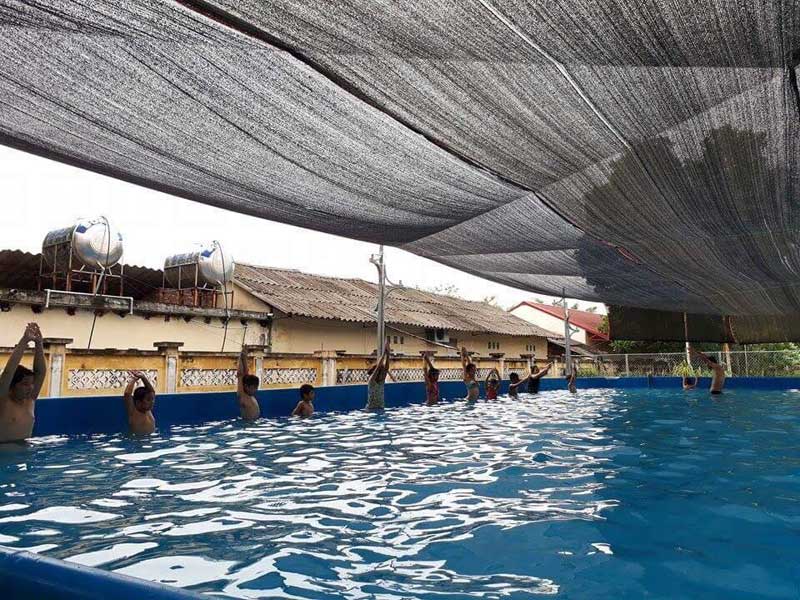
(HBO) – Summer vacation is a time when children temporarily leave their studying to enjoy, visit and have picnics. However, this is also the time for child drowning cases which made many families anxious.

In summer, many parents have registered
swimming lessons for their children at Provincial Youth Center.
To prevent from drowning for children, the
first and most important thing is to teach children to swim. Perceiving about
the importance of drowning prevention, many families have taken their children
to swimming lessons. This does not only help children relax, but also train
them swimming skills. In the moment, apart from some swimming pools in Hoa Binh
city, some places have started to build swimming pools and put swimming centers
into operation, which has met social demand. In addition, child drowning
prevention has been interested by Ministry of Education and Training, schools
and educational institutions, therefore, it has been implemented seriously and
effectively. For example, many schools provide swimming pools and free swimming
lessons for students. They also combine into extracurricular activities with
the contents of swimming safety tips, child drowning prevention. Secondly, they
can instruct the children to comply with safety regulations from home to school
and opposite, not allow children to play near ponds, lakes, rivers, streams,
canals, ditches or places where there is a risk of drowning, organize the
workshop about the model of "Universal Swimming in school" as well as
instruct how to rescue drowning cases, and organize swimming competitions for
students. As a result, it will help children enhance swimming skills and
drowning prevention.
At the present, except to swimming lessons
for children, they should be taught about life skills and water safety skills
as well. Swimming module ought to be gradually organized in schools and the
districts would develop the work of teaching swimming encourage children to
participate in group activities in order to minimize the risk of injury and
drowning. At the same time, the organizations actively implement the
construction of "Safe house", "Safe school" and "Safe
community" with the target of preventing from accidents and injuries, and
eliminating the risk of drowning for children.
More than just an information technology teacher, Bui Van Nien is an inspiring figure who has nurtured the scientific curiosity and creative spirit of students in Vietnam’s ethnic minority communities.
Da Bac is the most disadvantaged mountainous district in Hoa Binh province, with ethnic minorities accounting for about 90% of its population. Over the past years, the district has mobilised resources to implement ethnic policies to improve the quality of life of local people.
In recent years, Hoa Binh province has consistently prioritised the protection, care, and education of children, particularly those from ethnic minorities and disadvantaged backgrounds, by creating a safe, healthy, and nurturing environment for their all-round development.
The Steering Committee for Tobacco Harm Prevention and Control of Hoa Binh province, in coordination with the Tobacco Harm Prevention and Control Fund, held a ceremony on May 28 in response to the World No Tobacco Day (May 31) and the National No Tobacco Week (from May 25 to 31). The event was chaired by Nguyen Van Toan, Standing Vice Chairman of the provincial People’s Committee and head of the Steering Committee.
Since 2021, the Center for Industrial Promotion and Industrial Development Consulting (CIIDC) under the Department of Industry and Trade has been implementing a school lighting model as part of the plan for using energy efficiently and economically in Hoa Binh Province in the pẻiod of 2021 - 2025. This model not only aims to improve the learning conditions and enhance the education quality, but it also promotes the message of energy saving, energy security, environmental protection and contributes to the goals of socio-economic development.
In the 2024 - 2025 school year, the entire Hoa Binh provincial education sector includes 520 educational institutions and schools. Among them are 13 ethnic boarding schools with 153 classes and 4,487 students. Four of these schools have met national standards, reaching 30.7 percent.



